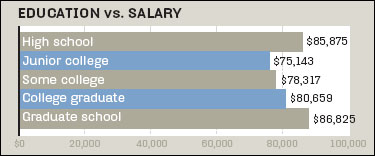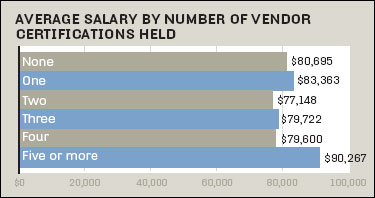Big pay for storage jobs, page 3
Find out what other storage professionals are being paid in this year's salary survey.
Education can play a big role in determining compensation, but not necessarily in the way one would suspect. While it's true that respondents to this year's survey reported average salaries that climbed relative to the number of years of post-high-school education they had, a single anomaly flies in the face of your mother's warning that if you don't go to college you won't amount to anything. This year, unlike in years past, respondents who said their formal education didn't go beyond a high-school degree had an average salary of $85,875 --approximately $1,000 less than respondents who said they attended graduate school. Perhaps spending less time in school allowed those high-school grads more time to build their careers and gain experience (see "Education vs. salary").
For storage careers, the kind of education you get from doing storage seems to be more important than studying computer science in college or grad school. Nearly 70% of our respondents say they have 10 or more years of IT experience (vs. slightly more than 65% in 2005), which nets them an average salary of $85,469. Those with less than 10 years of IT experience averaged $70,490 per year. And practical storage experience is an even hotter commodity that translates into higher pay. For the 25.2% of respondents with five or more years of dedicated storage experience, the average salary is $91,283, which is considerably higher than the $77,428 average for those who have been focused on storage for less than five years.

Storage education is available in other forms, too, from vendors or outfits that specialize in specific technical training. This is a common route for all IT professionals to bone up on their skills or to learn new ones. In the broad IT world, the generally accepted acknowledgement of this type of education is certification, and certifications for networking and server disciplines can help secure an IT job and ensure steady pay raises. But perhaps because networked storage is still a relatively new specialization, storage-specific certifications don't seem to carry much weight, especially in determining salary levels.
There was little difference in average salary among respondents who reported holding no certifications or those with one to four certifications; the average salary for those without any certifications is $80,695, while salaries for one certification to four certifications ranged from $77,148 (for two) to $83,363 (for one). The big payoff comes for those with five or more certifications, with an average salary of $90,267 (see "Average salary by number of vendor certifications held"). While these statistics suggest that certifications only matter if you have a bunch of them, it's more likely that someone who has had the time and opportunity to get five or more certifications under their belt has been around storage a while and gained considerable experience; this may contribute more to the higher salary level than the certifications themselves.

Storage pros aren't all that sold on certifications either. While more than half of the respondents who hold at least one certification think it may have helped their careers, only 16.9% see them as a definite help in their careers. Nearly 33% don't see any benefit at all. But Foote has found that Storage Networking Industry Association (SNIA) certifications in particular can be valuable, boosting salaries anywhere from 6% to 12%. Still, Foote emphasizes that skills usually trump certifications. "It's so difficult to find people good at SAN," he says. "If they find you, they're not going to withdraw an offer because you don't have a certification."
Ken Bartels, manager of Unix computing at PharmaCare Inc. in Pittsburgh, doesn't place too much importance on certification, but still sees the benefit. "They're not important, but I've asked two people [on the staff] to work toward certifications," says Bartels. "I think it's worthy for them career-wise to do that and for us, as well, to make sure that they're in a continued position to do well." "Certification will get your foot in the door for the interview, that's about it," says Comverse Technologies' Preston. "It doesn't necessarily prove that you have the skill set required to go do the job." He feels that having an official certification "wouldn't affect your paycheck."
At CPAmerica International, a trade association for accounting firms based near Gainesville, Fla., network administrator George MacKay is more interested in specialized training than vendor-related certifications. "All the retention requirements that have come out in the last two years … it's going to be a big issue going forward in storage management," says MacKay.










